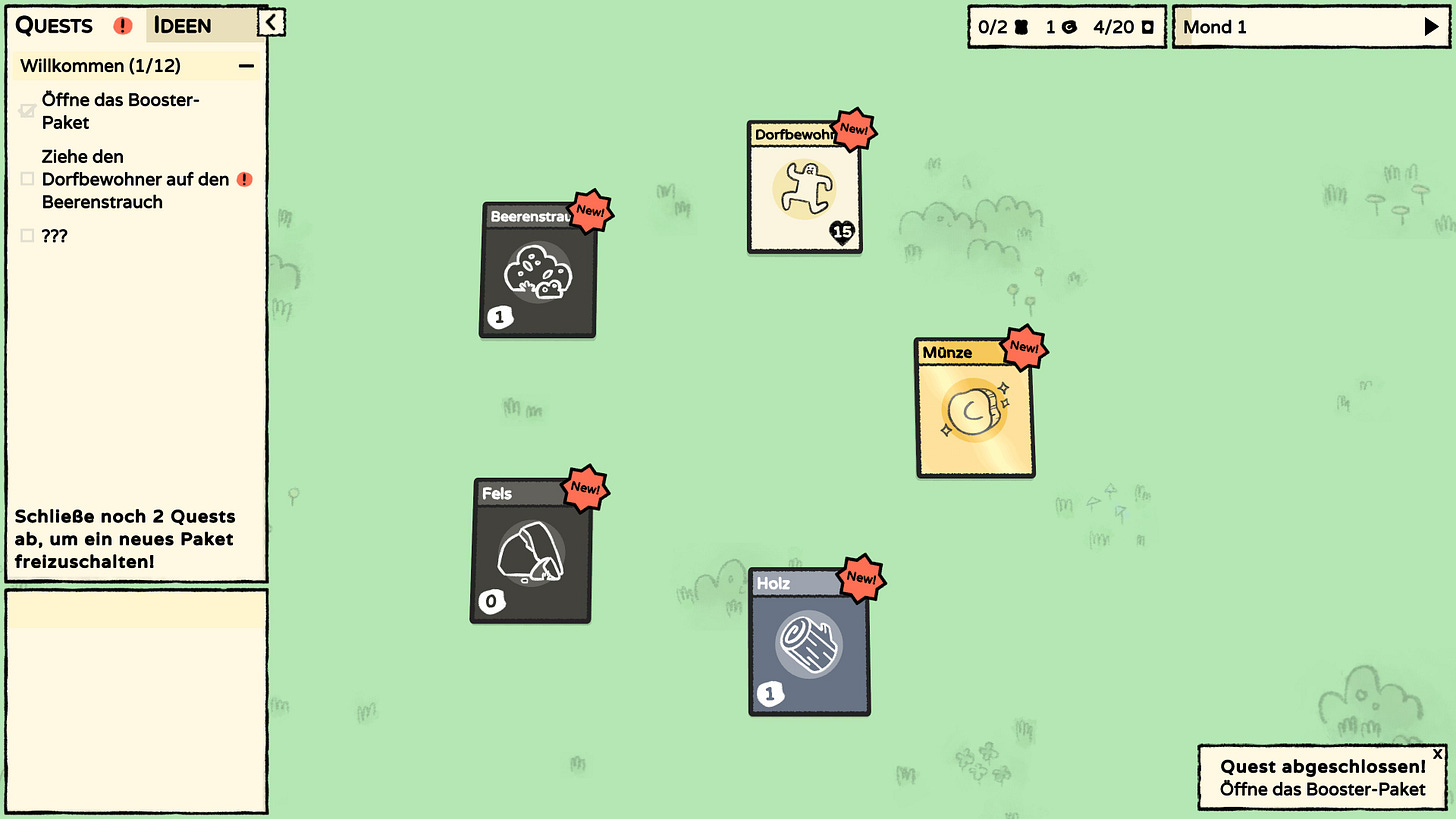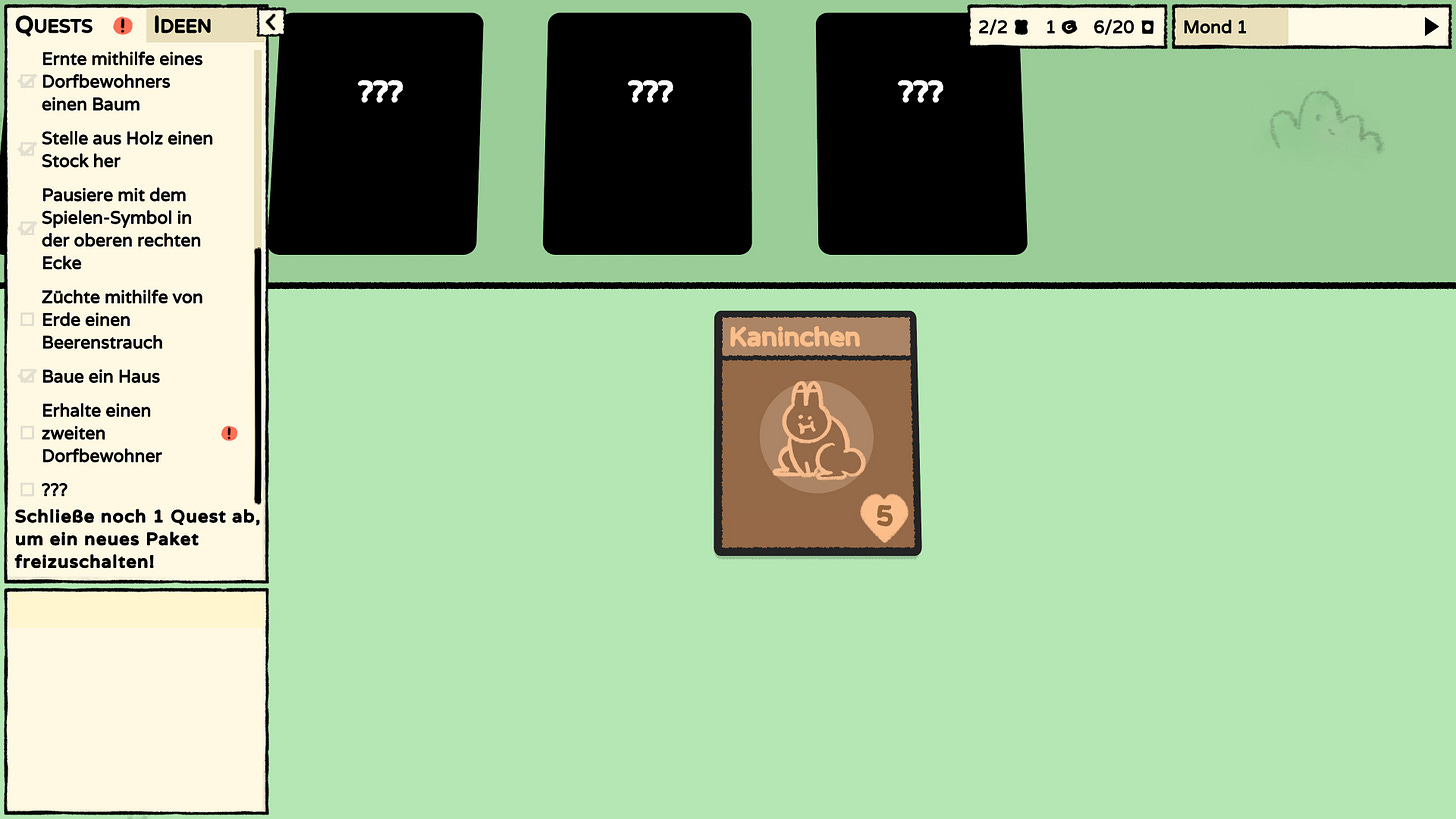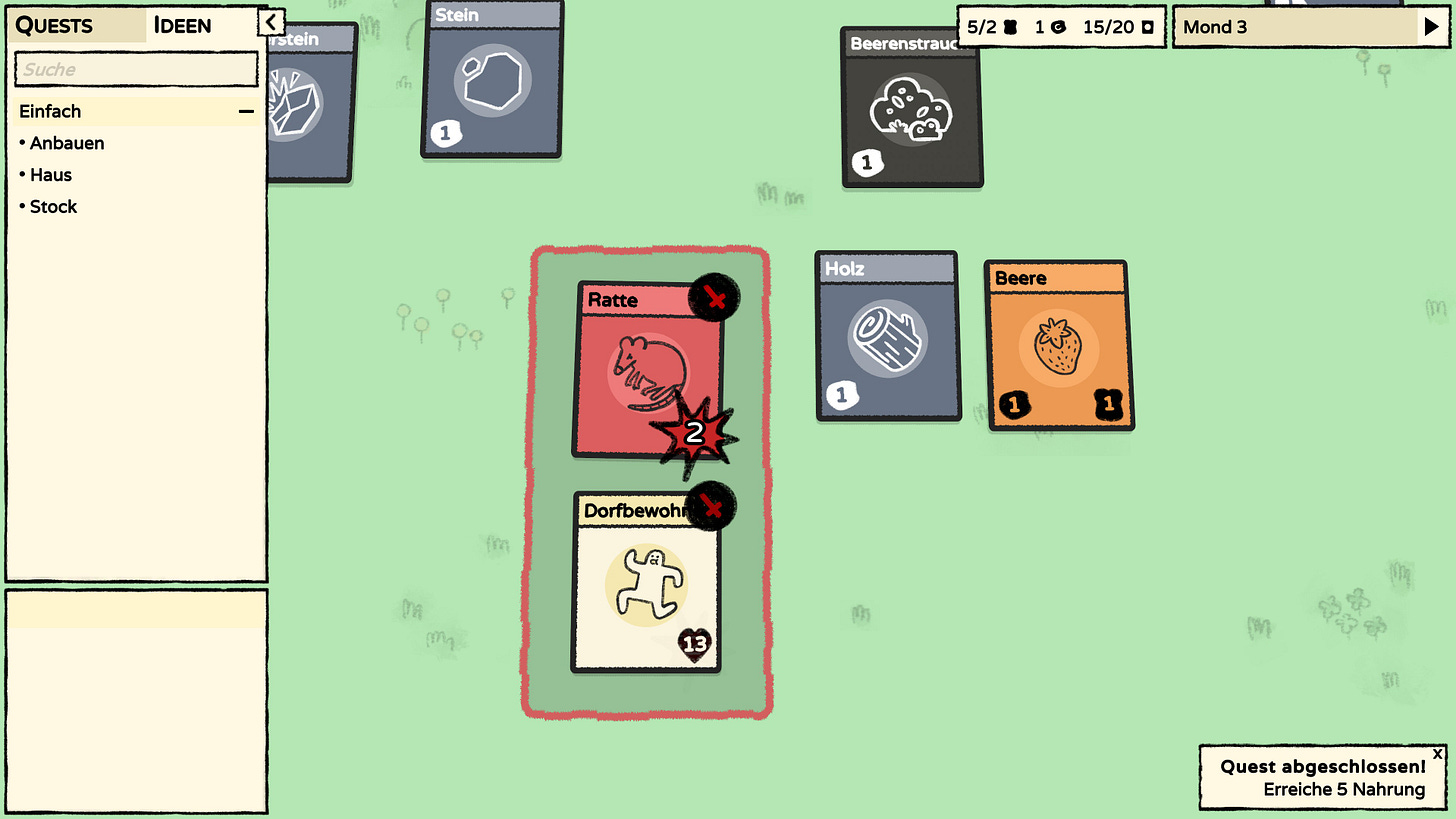Foreign Language Game Review: Stacklands (2022)
It's a short game full of tension.
Hallo zusammen, for anyone who found this randomly, I’m a language learner using video games to learn a foreign language (German, in my case) and I’ve been blogging about it to keep me on it. This week I played Stacklands, a cross-genre city-card-deck-builder-monster-fighter and I do recommend it to early language learners, despite its limited scope and short playtime.
Also, despite the fact that this is a kinda cutesy cozy game, there is some level of mystery and surprise from the expanding world and I’m going to do my best not to spoil anything past the first five minutes.
The game unifies text and images in a helpful way for language learning.
Everything in this game, from villagers to berries to the idea of building a university, is represented with a card, and since every card is both drawn and labelled, this game has a visual dictionary for almost all the text it asks of you.
I used my pocket dictionary once (I got confused at the use of the word ‘Stelle’) and asked my husband for translations twice (‘Eisenstange’ was eluding me, if I remember correctly), but I was able to rely on the images—and my prior knowledge—fairly well. Now, this game uses a lot of text that previous games use, which was helpful and I imagine this game would make setting off in Skyrim a more pleasant A1 experience.
Moreover, the text-only quest objectives force players to engage with the language and not just the images on the cards.
Excellent graphics can be a double-edged sword when learning a language: graphics help players understand things, but if they’re too efficient at communicated what an object is or what to do with it, then players will stop paying attention to the text-altogether (this is what happened to me, when I played Growing Up).
This didn’t feel like a problem in Stacklands, however, because the quest objectives were exclusively German, which meant I had to understand both the verb it was commanding me to do as well as the noun (the card) it wanted me to do it too.
Example: Erhalte einen zweiten Dorfbewohner —> Get a second villager.
Because quests were only revealed to me as I unlocked them, this meant that my brain was attentive to the names of every card I opened, kept or sold, since I knew I might be required to use them later to complete a quest.
That being said, at times this game is so intense that my brain did start ignoring the new words I was seeing.
The primary game loop of Stacklands is ensuring that your people are fed each month, a obstacle that requires some level of eco management, time investment and world exploration (via buying booster packs with gold, this game’s exploration mechanic).
As the game progresses and the exploration goes deeper into new concepts, monsters appear and players must manage their need for progress and their ability to respond to threats.
Given the right cards, the villager’s nutritional demand can be easily handled, but the threat of danger increases with time and so managing both economy and security at once can feel overwhelming. It’s a compelling game mechanic, but not a great one for picking up new language, which is sad because that’s also when most of the new language is introduced.

And the game is short, so this fatigue is meaningful.
This stressful period was only the last hour or hour-and-half of when I played, but since this game is only six hours long, that’s a meaningful chunk of time.
Overall, I ended up losing the game twice: once because I ran out of food early on, and once near the very end to a difficult monster that survived on 12 HP. I believe that’s a common place for players to die and I knew I had the skills and knowledge to replay for a victory, but I decided to move on, since I’m (to my great happiness) above the language level I’d place this game at.
I do believe there’s DLC to expand the game and, based on Steam reviews, this game has many fans who enjoy replaying the game, but overall, this game was developed to be a fun time, not a long time.
I think that brings me directly to my CEFR rankings:
A1: Vier Sterne (ü ü ü ü)
It is so wonderful to find and review A1-appropriate games. Between the excellent visuals, low-cost and ability to replay the game quickly, I think this could be a strong contender for baby’s first ever foreign language game.
A2: Drei Sterne (ü ü ü)
There are definitely many A2 gamers who would get more out this game than many A1 gamers, but I couldn’t give this game more than three stars.
B1: Zwei Sterne (ü ü)
The verbs alone spare Stacklands from receiving only one star at the B1 level.
B2: Ein Stern (ü)
I’m only giving Stacklands one star at the B2 level, because I’m not sure what language Stacklands would introduce a B2 reader. It strikes me that I gave Pokémon Platinum two stars at the B2 level, but, in fairness, I can guarantee that Pokemon Platinum would teach a player words like Bidoof and Staraptor.
C1 & C2: Null Stern ( )
I’ve never given a game zero stars before, since almost every media has something to give, but Stacklands deserved to break this mold. This isn’t a comment on the gameplay; in fact I actually think its a testament to how accessible the game is that I just could not imagine a word, phrase or concept that would be new to a C1 or C2 learner.
I think there’s something about good A1 games that just take away my ability to put jokes in my review. Oops, well, here’s hoping my suffering in game’s above my level pays off at least comedically the next time I try it.
Tschüss
Boudicca





